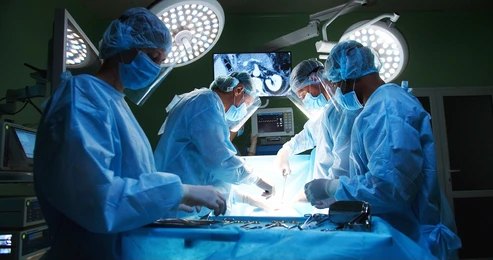Neurological disorders affect millions worldwide, causing a significant impact on physical, emotional, and cognitive well-being. These conditions stem from complications in the nervous system, which includes the brain, spinal cord, and peripheral nerves. While some neurological issues are mild, others can severely disrupt a person’s quality of life. Neurosurgeons, specialists in diagnosing and treating conditions of the nervous system, play a pivotal role in managing these disorders. If you’re seeking the Best Neurosurgeon in India, understanding the expertise they offer can help you make informed decisions about your health.
Understanding Common Neurological Disorders
Neurological disorders encompass a wide range of conditions. Here are some of the most prevalent ones and the treatment options neurosurgeons provide:
1. Stroke
A stroke occurs when blood flow to a part of the brain is interrupted or reduced, depriving brain tissue of oxygen and nutrients.
Symptoms:
- Sudden numbness or weakness, especially on one side of the body.
- Difficulty speaking or understanding speech.
- Vision problems in one or both eyes.
Treatment by Neurosurgeons:
Neurosurgeons may perform a craniotomy to relieve pressure from swelling or remove a blood clot. For ischemic strokes, they may use advanced techniques like endovascular thrombectomy, which involves removing the clot using a catheter.
2. Brain Tumors
Brain tumors can be benign (non-cancerous) or malignant (cancerous). They affect brain function by exerting pressure on surrounding tissues.
Symptoms:
- Persistent headaches.
- Seizures.
- Cognitive or behavioral changes.
Treatment by Neurosurgeons:
Surgical intervention is often the primary treatment. Neurosurgeons use techniques such as stereotactic surgery or awake craniotomy to safely remove the tumor while preserving neurological function. In some cases, surgery is combined with radiation or chemotherapy.
3. Epilepsy
Epilepsy is a neurological condition characterized by recurrent seizures due to abnormal brain activity.
Symptoms:
- Temporary confusion.
- Uncontrollable jerking movements.
- Loss of consciousness or awareness.
Treatment by Neurosurgeons:
When medication fails to control seizures, surgical options such as lobectomy (removing the seizure-causing brain area) or vagus nerve stimulation (VNS) are considered. Advanced techniques like laser interstitial thermal therapy (LITT) are also gaining popularity.
4. Parkinson’s Disease
Parkinson’s disease is a progressive disorder affecting movement, caused by the degeneration of dopamine-producing neurons.
Symptoms:
- Tremors.
- Muscle rigidity.
- Slowness of movement (bradykinesia).
Treatment by Neurosurgeons:
For advanced cases, neurosurgeons perform deep brain stimulation (DBS), a procedure where electrodes are implanted into specific brain areas to regulate abnormal signals and improve motor symptoms.
5. Spinal Cord Disorders
Spinal cord issues like herniated discs, spinal stenosis, or spinal tumors can lead to severe pain, mobility issues, and nerve damage.
Symptoms:
- Chronic back pain.
- Weakness or numbness in limbs.
- Loss of bladder or bowel control in severe cases.
Treatment by Neurosurgeons:
Neurosurgeons use minimally invasive techniques like microdiscectomy for herniated discs or spinal fusion to stabilize the spine. Advanced imaging technologies guide these precise interventions, ensuring better outcomes and shorter recovery times.
Advancements in Neurosurgical Techniques
Modern neurosurgery has witnessed remarkable advancements that enhance precision and reduce risks. Here are some of the innovative techniques neurosurgeons employ:
1. Minimally Invasive Surgery (MIS)
Using small incisions and specialized tools, MIS reduces recovery time, lowers infection risks, and minimizes scarring.
2. Neuro-navigation Systems
These systems act like a GPS for the brain, helping neurosurgeons locate and treat abnormalities with exceptional accuracy.
3. Robotic-Assisted Surgery
Robotics enhances a surgeon’s ability to perform complex procedures by providing improved dexterity and vision.
4. Intraoperative MRI and CT Scans
Real-time imaging during surgery ensures optimal precision, especially in delicate procedures like tumor resection.
The Role of Rehabilitation in Neurological Disorders
Surgical treatment is often just the beginning of recovery. Rehabilitation plays a crucial role in regaining lost functions and adapting to changes. Patients may require:
- Physical Therapy: To improve strength and mobility.
- Occupational Therapy: To enhance daily living skills.
- Speech Therapy: For speech or swallowing difficulties.
The collaborative efforts of neurosurgeons, therapists, and caregivers significantly influence the recovery journey.
FAQs About Neurological Disorders and Neurosurgery
1. What are the warning signs of neurological disorders?
Warning signs include persistent headaches, memory loss, seizures, sudden numbness, and difficulty speaking or walking. If you notice these symptoms, seek medical attention promptly.
2. How can I prepare for neurosurgery?
Follow your surgeon’s pre-operative instructions, which may include fasting, medication adjustments, and lifestyle changes. Mental preparation and understanding the procedure can also help reduce anxiety.
3. Are minimally invasive neurosurgeries effective?
Yes, minimally invasive techniques are highly effective and offer several benefits, including shorter recovery times, reduced pain, and fewer complications.
4. What is the recovery time for neurological surgeries?
Recovery time varies depending on the procedure and individual health. Some patients recover in weeks, while others may require months of rehabilitation.
